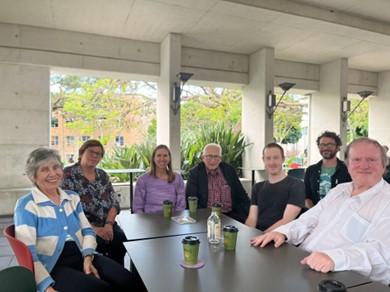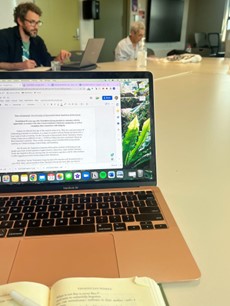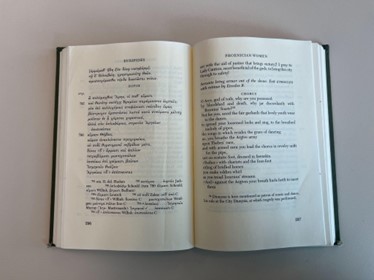Established in the 1980s, this Translation Group of alumni, students and staff provides its attendees with the opportunity to connect with other Greek translators within the community, as well as strengthen their connection with antiquity.
Fridays are often the best day of the week for many of us. They are a universal marker of forthcoming relaxation or recreation; or a chance to connect with our friends and family after a busy week of work or learning. For the University of Queensland’s Greek Translation Group, Fridays are no different. In fact, 1:10 PM on Fridays has been a permanent fixture on these translators' schedules for many years. I had an opportunity to interview various members of this translation group, discussing how these weekly meetings connect members both young and old, alumni and students, resulting in a vibrant exchange of knowledge, and friendship.

Since its inception, the Translation Group has followed the structure of allocating several people each week to read segments of approximately thirty lines of Greek each. Members translate Greek into English as they go, leaving room for conversation, questions, debates, and for other members to offer suggestions on how to best enhance their translations. For the past couple of weeks, they have been translating the Classical play The Phoenician Women by Euripides.
Emeritus Professor Robert D. (Bob) Milns led the Translation Group for most of its duration until he passed away in early 2020. Many current members of the Translation Group who knew Bob note that his presence is greatly missed. In conversation with Bob’s widow - Lynette Milns - she describes Bob as being an “eminent Classicist,” who spent his life endeavouring to deepen UQ and the wider community’s understanding of the Ancient world, a sentiment undoubtedly experienced by all those who attended the weekly meetings while Bob oversaw them. Since his passing, Dr. Amelia Brown has overseen the Translation Group. Members are ever-grateful that they can continue to uphold Bob’s memory, which in turn can further flourish and bring joy to all those who attend.
The methodological translation process that Bob established - continued by Amelia - is always completed by the group catching up over a cup of coffee, with members taking turns to shout this treat each week. At one of the afternoon catch-ups I attended, longtime member Dr. Russell Davies - who has a PhD in theology - and I swapped our favourite snippets from antiquity and history over a cup of coffee. We discussed the Spartans, Australian convicts, World War II, and everything in between. After our chat had caught up to the present, he smiled softly, pensively noting that those who study the Classics, history and translation are connected by its sense of “warmth.”
This comforting warmth that Russell described is overwhelmingly evident within the Translation Group. Patrick Buckridge, a retired Adjunct Professor in Literary Studies at Griffith University concurs, yet also notes that these temperatures can sometimes arise into heated debates over mistranslations. However, generally, the meetings are extremely “socially enjoyable.” Upon retiring, the Translation Group became the main focus of Patrick’s week. This weekly touchpoint connects him with others who relish the “mix of hard intellectual work, and leisurely literary appreciation,” which
“makes for a stimulating and worthwhile experience”.
Patrick firmly maintains that the literature of ancient Greece is “incredibly rich and timeless.” His appreciation for the Greek Classics has persisted in his life since he was 10 years old. Thus the Translation Group provides an opportunity to discover new meanings, insights and tidbits within his well-loved Classics, through the support of other like-minded intellectuals. He wryly admits that in attending these weekly meetings for over 20 years, it has increased his tendency to be irritated by grammatical errors and wrongly-used words.
Continuing on the humorous trajectory, he notes that COVID-19’s eruption in Brisbane in 2020, sent the weekly Friday meetings on to Zoom, teaching everyone a lesson in “interpersonal tolerance.”
Impersonal tolerances aside, the Translation Group’s shift to Zoom during the height of COVID-19 proved extremely fortuitous for some. Peter Brown, Senior Lecturer in Mathematics at UNSW, also teaches Greek at the University of Sydney, and serves as a Guest Lecturer in the Ancient Languages School at Macquarie University; he joined when the Translation Group shifted to online delivery.
Peter details that the weekly meetings were a “very welcome relief from the isolation that COVID-19 caused.” It provided a weekly touchpoint, and importantly remedied the missing element of social interaction during the pandemic. Due to its outreach during COVID-19, the group opted to maintain a hybrid mode once mandates were lifted. Peter affirms that any opportunity to connect over Greek, especially in a group setting, is extremely “valuable” to him.
Former UQ student, Demetrios Raikos, animatedly proclaims “Thank God for Zoom!”. He notes that whilst he was studying for a Master of Museum Studies, the Translation Group was his only anchor to UQ during the pandemic-induced mandates. These weekly meetings also provide Demetrios with another anchor; the opportunity to honour and continue to connect with his late Grandfather, Dimitri, who read Demetrios the myth of Perseus, encouraging him to learn the myth in Greek. Furthermore, Demetrios considers it to be a “great pleasure” to embark on “intellectual and academic adventures” each week with people in the Translation Group.
These adventures within the Translation Group were happened upon purely by chance by Stephen O’Brien. He bumped into Professor Alastair Blanshard, the Paul Eliadis Chair of Classics and Ancient History at UQ, who suggested that Stephen join this group based on his personal interests. Having studied a Bachelor's degree in Classics at Oxford in 1972, he notes that “Greek is always there”; it was an intellectual hobby that provided stability and grounding throughout his academic and professional life. He maintains that those in the Translation Group were connected by their love of the Classics, which also provided meaning during the uncertainty of COVID-19.
Stephen identifies three types of people within the Translation Group; people who are currently studying; people who have a cultural background that includes the Greek language, and people like him who have studied and retained their love for the Classics. These categories amalgamate, enhance one another, and make it an interesting and diverse group. Stephen is particularly interested in the perspectives of those currently undertaking tertiary study. New perspectives from students further nuance, and even change, the ideas that he has collected through his many years engaging with the Classics and translation.
Furthermore, the Greek Translation Group can be a place for those still studying to further enhance their translation abilities. Current UQ Honours Student, Ethan Clark-Kistowski corroborates this view. Although he laments not being able to attend the weekly meetings every semester due to coursework clashes, he still appreciates how the Translation Group creates a space for people to intellectually connect over their love of antiquity. However, Ethan jokingly suspects that those in the Translation Group “took it easy” on him when it was his turn to translate. Despite his sneaking suspicions, he was always thankful for the considerate advice he received within the Translation Group. Ethan hopes to rejoin the weekly meetings as soon as possible, as he maintains that the guidance and connection it provided throughout his Honours degree will be just as appreciated when he commences his Master's degree in Classics next year.

Carolin Henry rejoices in the warm collaboration and connection between different people within the Translation Group, stating that it has forged “strong friendships between young and old.” She especially notes that
“as a woman, [she] feels very empowered by the broadening horizons that the Classical studies have provided” her.
Furthermore, Carolin congratulates UQ on its encapsulating “breadth” of a Classical academic curriculum in the face of a quickly diminishing Classical sector in Australian tertiary education. However, activities such as the Translation Group have the ability to combat this phenomenon. Older custodians of the Classics have the opportunity to impart their wealth of knowledge to younger generations within the group; allowing the latter to continue to nuance and strengthen the Classics.
My discussions with Russell, Patrick, Peter, Demetrios, Stephen, Ethan and Carolin prove that there will always be space for those who value the Classics, and the connections that studying them provide. Faced with tribulations such as Bob’s passing, the challenges accompanying navigating COVID-19, and a diminishing Classical sector in secondary and tertiary education, these weekly meetings prevailed due to the members’ strong connections to one another, and love for the Classics.
Eloise Thomson is a 3rd year Advanced Humanities student. This article has been produced in a series as a part of the Advanced Humanities Internship course with UQ HASS Advancement.
